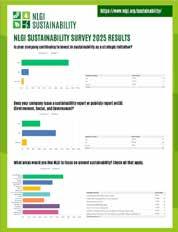

Leadership in Sustainability Award at 2025 Annual Meeting
In an industry increasingly focused on environmental stewardship and innovation, the Leadership in Sustainability Award celebrates individuals and companies championing a sustainable future. This prestigious honor recognizes those who go above and beyond to ensure that the grease industry evolves toward greater sustainability and responsibility.
Stay tuned to see the first recipient of this new award at the 2025 Annual Meeting!
NLGI SUSTAINABILITY SURVEY 2025 RESULTS
Is
What is the most important aspect of sustainability for your company?
If
What is your role regarding sustainability efforts within your company?
NLGI SUSTAINABILITY

COMMITTEE MEMBERS
Amber Dzikowicz, Chair | Dwaine (Greg) Morris, Co-Chair
Craig Bay | Casey Budd | Chad Chichester | Andreas Dodos | Cassie Fhaner | Gareth Fish Muibat Gbadamosi Ph.D. | Joe Kaperick | John Kay | Siri Kore | Constantin Madius | Joshua Sheffield | Yingdi Yuan
Staff Liaison: Crystal O’Halloran
NLGI SUSTAINABILITY
Sustainability Survey: A Deep(er) Dive, Industry Dialogue, and the Road Ahead
The NLGI Sustainability Committee extends its sincere thanks to all who participated in the second iteration of the Sustainability Survey, published in the previous issue of The Spokesman. Your feedback has been instrumental in shaping a clearer picture of where the lubricating grease industry stands on sustainability—and where it’s headed.

Unpacking the Survey Results
While many survey responses offered clear-cut answers, the accompanying comments revealed a more nuanced landscape. For instance, 83% of respondents reported that their companies are actively investing in sustainability as a strategic priority, yet only 32% currently issue public ESG (Environmental, Social, and Governance) reports. This suggests that while sustainability is gaining traction internally, external transparency remains limited.
The survey also highlighted that efficiency improvements (27%) and customer demands (25%) are the primary drivers of sustainability initiatives. In contrast, corporate strategy, social responsibility, and regulatory compliance were cited as secondary motivators. This underscores a pragmatic, performance-driven approach to sustainability across the industry.
Industry Priorities: Four Key Focus Areas
Respondents identified four critical areas where they believe NLGI can provide the most value:
• Product Carbon Footprint and Lifecycle Analysis (LCA)
• Energy Efficiency and Savings
• Education on Handprint, Footprint, and LCA Concepts
• Regular Updates from Industry Experts
These focus areas reflect a desire for both practical tools and deeper understanding—especially as companies navigate the complexities of sustainability in grease formulation, manufacturing, and application.
The Case for a Standardized Carbon Footprint Tool
One of the most compelling findings: 85% of respondents support the development of a standardized tool to calculate the carbon footprint of grease products. However, only 41% currently provide product-level carbon data to customers, and 53% do not receive such data from their suppliers. This lack of consistency and transparency presents a challenge—and an opportunity.
To be effective, any carbon calculator must be credible, representative, and defensible. It must avoid becoming a tool for unsupported marketing claims and instead serve as a reliable benchmark for the industry.

NLGI SUSTAINABILITY
Building the Model: Leveraging Existing Infrastructure
Fortunately, the foundation for such a tool already exists. For decades, grease manufacturers have trusted NLGI’s Annual Production Survey to handle sensitive data securely. By integrating sustainability-related inputs—such as raw material carbon footprints—into this existing framework, NLGI can help build a robust, anonymous dataset that reflects real-world conditions across regions.
In collaboration with the ELGI’s consortium efforts, this initiative can lead to the development of a realistic, industrywide model that supports both internal decision-making and external reporting.
Looking Ahead
The path forward is clear: through collaboration, transparency, and education, the grease industry can take meaningful steps toward a more sustainable future. The NLGI Sustainability and Production Survey Committees are working together to make this vision a reality—and your continued engagement will be essential.
Stay tuned for future updates, resources, and opportunities to contribute to this important work.

COMMITTEE MEMBERS
Amber Dzikowicz, Chair | Dwaine (Greg) Morris, Co-Chair
Craig Bay | Casey Budd | Chad Chichester | Andreas Dodos | Mehdi Fathi-Najafi | Cassie Fhaner | Muibat Gbadamosi Ph.D. Joe Kaperick | Siri Kore | Constantin Madius | Ravi Menton | Joshua Sheffield | Yingdi Yuan Staff Liaison: Crystal O’Halloran
